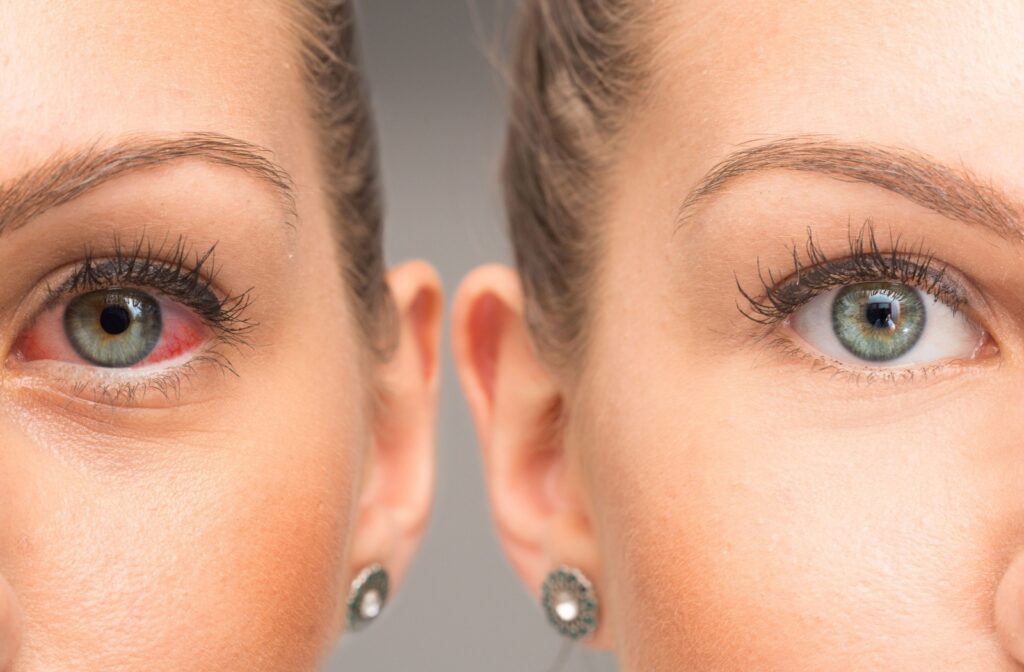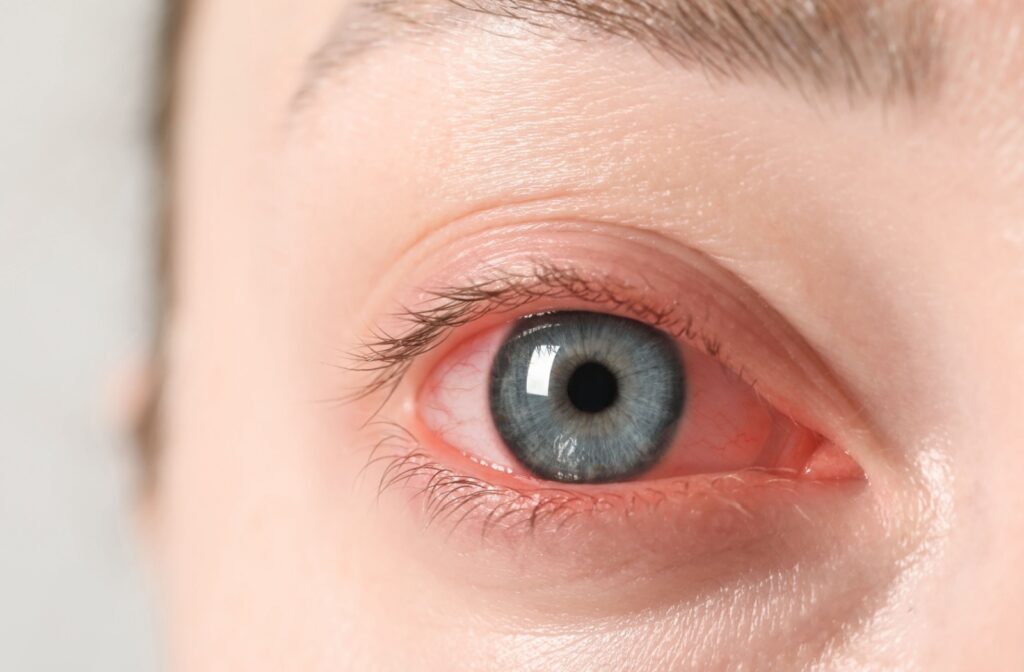Waking up to red, irritated eyes can be as unsettling as it is uncomfortable. If this is something you’ve experienced, you’re not alone. Understanding the underlying causes of red eyes is the first step in maintaining optimal eye health and addressing the issue effectively.
Several factors can contribute to red eyes in the morning, including dry eye disease. Some may be related to your lifestyle, while others might hint at underlying eye conditions or environmental contributors
Redness in the eyes isn’t always cause for alarm, but it’s worth exploring why this might happen, especially if it occurs frequently. Here’s what you need to know about the possible causes, prevention tips, and when to seek professional help.
What Causes Red Eyes Upon Waking?
Dry Eyes During Sleep
Your eyes need consistent moisture to remain healthy, but during the night, tear production slows down. If you already suffer from dry eye syndrome, the lack of lubrication can lead to redness and irritation upon waking.
Allergies or Irritants
If your bedroom is harboring allergens like dust mites or pet dander, your eyes might react by becoming red and swollen. Similarly, irritants like strong perfumes or cleaning products used near your sleeping area could be affecting your eyes while you rest.
Poor Sleep Habits
Late nights, insufficient sleep, or poor-quality rest can contribute to red eyes. When you don’t get enough rest, blood vessels in your eyes dilate as your body works overtime to compensate, leaving you with red, tired-looking eyes.
Contact Lens Use
Wearing contact lenses for longer periods than recommended, or failing to remove them before bed, can lead to corneal irritation and redness. Overnight contact lens use reduces oxygen flow to the cornea, creating redness by the time you wake up.
Eye Strain
Engaging in screen-heavy activities before bed, such as scrolling on your phone or watching TV excessively, can strain your eyes. This strain can linger into the morning, manifesting as redness and discomfort.
Blepharitis (Eyelid Inflammation)
Blepharitis is a condition where the eyelids become inflamed, often due to bacteria or clogged oil glands. This can result in red, crusty eyes during and after sleep.
Conjunctivitis (Pink Eye)
Conjunctivitis, commonly known as pink eye, can be another reason for red eyes in the morning. If caused by bacteria or viruses, it’s often accompanied by discharge or a gritty feeling.
Could Chronic Dry Eye Be the Cause of Your Morning Red Eyes?
If your eyes feel red, gritty, or irritated the moment you wake up, and this happens more often than not, chronic dry eye syndrome could be playing a bigger role than you think.
Dry eye disease affects nearly 49 million Americans, and one of the most common causes is something called Meibomian Gland Dysfunction (MGD). These tiny oil glands in your eyelids are responsible for producing the protective outer layer of your tear film. When the glands become blocked or inflamed, they can’t produce the healthy oils your tears need to stay stable and nourishing—especially overnight, when tear production naturally slows down.
Instead of waking up with refreshed, hydrated eyes, MGD can leave you with redness, burning, or even excessive tearing as your eyes struggle to compensate.
However, MGD (and dry eye disease as a whole) is treatable, and identifying it early can make a world of difference in how your eyes feel every morning.
Tips to Prevent Red Eyes in the Morning
If your red eyes are caused by non-serious reasons, making small changes to your daily and nightly routine might make a significant difference.
1. Establish a Sleep-Friendly Routine
- Aim for 7–9 hours of quality sleep per night.
- Create a calming bedtime routine to reduce late-night eye strain.
- Reduce screen exposure at least 1–2 hours before bed to prevent blue light fatigue.
2. Hydrate Your Eyes
- Use lubricating eye drops, especially if you’re prone to dry eyes.
- Consider a humidifier in your room to maintain moisture in the air.
3. Improve Sleep Hygiene
- Wash your bedding regularly to minimize allergens such as dust mites.
- Avoid sleeping with makeup on, which can irritate your eyes.
- Ensure your sleeping environment is free of irritants like strong fragrances.
4. Care for Your Contact Lenses
- Always follow recommended contact lens care and wearing schedules.
- Never sleep in lenses unless explicitly prescribed by your eye doctor.
5. Treat Underlying Conditions
If conditions like blepharitis or allergies are affecting your eyes, seek advice for proper treatment. Medical-grade eyelid cleansers or allergy medications might help resolve the problem.

When to See a Doctor About Red Eyes
While occasional redness isn’t uncommon, there are instances where it’s critical to seek medical attention. Reach out to an eye care professional if:
- Your red eyes are accompanied by pain or extreme sensitivity to light.
- You notice changes in your vision or discharge from the eye.
- The redness doesn’t resolve with basic care or persists over several days.
- You are having to use redness relief drops daily
Chronic redness could indicate a more serious condition, such as uveitis, glaucoma, or corneal damage. An eye health expert can provide a thorough evaluation, pinpoint the cause, and recommend tailored treatment options.
If you think you’re experiencing dry eye disease, it’s also important to visit your eye doctor, as these symptoms may not go away on their own.
Treating Dry Eye Disease at Eyes on Westlake
How We Diagnose Dry Eye at Our Clinic
Getting to the bottom of morning eye redness starts with a proper diagnosis—and that’s exactly what we offer at Eyes on Westlake. Our dry eye evaluations are designed to uncover the exact cause of your symptoms, so we can recommend the most effective, targeted treatment plan.
We begin by discussing your symptoms, lifestyle, and medical history. From there, we use advanced diagnostic tools to evaluate your tear film quality, meibomian gland function, and ocular surface health. In many cases, we find that inflammation or gland blockages—especially from Meibomian Gland Dysfunction—are the underlying culprits.
By pinpointing whether your dry eye is caused by evaporative issues, inflammation, bacterial buildup, or a combination of factors, we’re able to offer solutions that go beyond short-term relief.
If you’re experiencing recurring redness, irritation, or dryness when you wake up, don’t just mask the symptoms—let’s get to the source.
Treating the Root Cause of Dry Eye at Eyes on Westlake
Once we’ve identified what’s causing your dry eye symptoms, we can recommend treatments that go beyond temporary relief. At Eyes on Westlake, our focus is on restoring the health of your meibomian glands and breaking the cycle of chronic irritation.
One of the most effective options we offer is OptiPLUS Radiofrequency (RF) therapy, which uses gentle, targeted heat to stimulate collagen, improve circulation, and melt away hardened oils that block your tear glands. This therapy not only improves tear quality but also enhances skin tone around the eyes—a bonus benefit many patients love.
For patients with inflammation or ocular rosacea, OptiLight IPL (Intense Pulsed Light) is an FDA-approved solution that targets abnormal blood vessels and reduces inflammation on the eyelid margins. It’s a drug-free, drop-free treatment designed to help stabilize your tear film and support long-term eye comfort.
We also recommend ZEST Blepharoexfoliation, a quick in-office cleaning treatment that removes bacteria, debris, and Demodex mites from the lash line—one of the most overlooked contributors to dry eye symptoms. Think of it as a deep cleanse for your eyelids, leaving them fresh, clear, and better able to support healthy tear production.
Together, these treatments allow us to create a customized dry eye plan that targets the root of your symptoms, not just the surface. If you’ve been relying on artificial tears without lasting relief, it might be time to explore a new approach—one that’s tailored to your eyes, your needs, and your comfort.
Protecting Your Eye Health Starts Here
Red eyes can be more than just a minor annoyance, they may signal that your eyes need extra care, adjustments to your routine, or even dedicated treatment from your optometrist. By taking preventive measures and addressing underlying factors such as dry eye disease, you can wake up with clear, comfortable eyes and prioritize eye health every day.
For more tips and personalized advice, schedule a consultation with one of our eye care professionals at Eyes on Westlake. Remember, your eyes deserve the best care, starting today. Stay proactive about your eye health, it’s a small effort with a big payoff!





